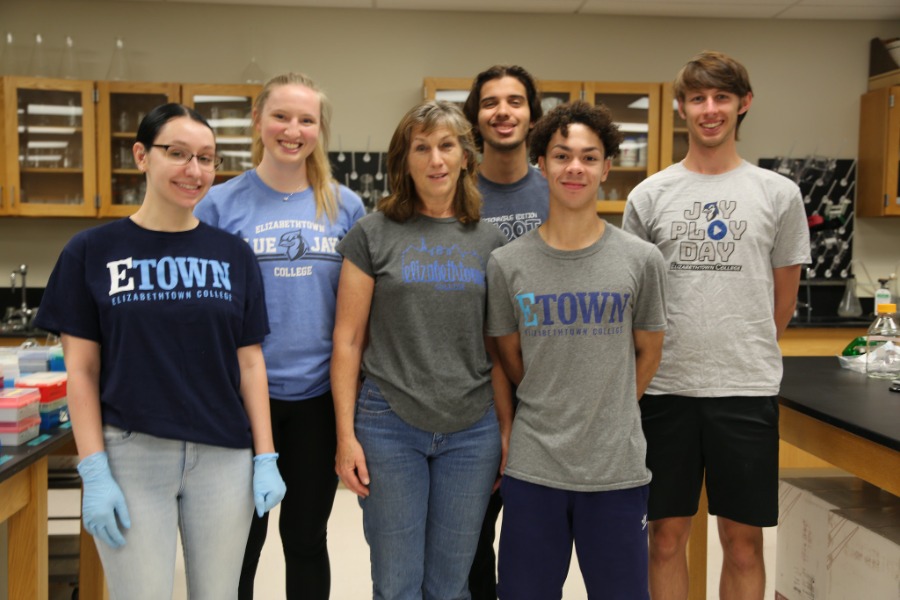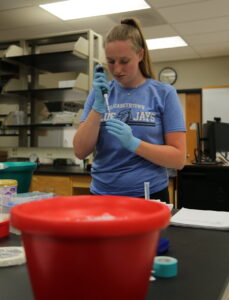Five Elizabethtown College students, Camilo Arenas ’23, Alec Delgado ’24, Justin Enochs ’23, Isabella Goebel ’24, and Julia Randazzo ’23, are studying the hallmarks of cancerous cells compared to non-cancerous cells. Their research explores how the expression of a viral, tumor-causing protein alters the proteins produced in the cell. They hope to find which of these altered proteins correlates to the aggressive growth characteristics of cancer cells. They are also examining how the viral oncoprotein causes the production of the alternative versions of the host cell proteins. Through this research, the students hope to develop more nuanced ways to target harmful cells while avoiding healthy cells during cancer treatment.
Brandon Baxter ’24 is working with the team and is conducting research associated with an interdisciplinary project with Professor of Chemistry Jeff Rood. Brandon is creating a new cell line that will be used to assess chemicals that can act like insulin and help move glucose out of the blood and into cells. His project is to insert a green fluorescently-tagged glucose channel into mouse adipose cells so that chemical effectiveness and glucose uptake can be easily monitored, making drug development faster.
The independent student research and collaboration with an Etown faculty mentor is part of the Summer Creative Arts and Research Program (SCARP) program.
Tumor Virus Upregulation of the Splicing Factor SAM68 in Human Diploid Fibroblast Cells and its Correlation to Transformed Phenotype (Camilo Arenas, Alec Delgado, Justin Enochs, Isabella Goebel, and Julia Randazzo)
Vanadium Complex Effect on GLUT4 Translocation (Brandon Baxter)
Student Researchers
Camillo Arenas ’23 (Biomedical Research and Communications major)
Alec Delgado ’24 (Biology major)
Justin Enochs ’23 (Biochemistry and Molecular Biology major)
Isabella Goebel ’24 (Biochemistry and Molecular Biology major)
Julia Randazzo ’23 (Biotechnology major)
Brandon Baxter ’24 (Biology major)
Faculty Mentor
Jane Cavender, Professor of Biology
What are you researching?
Julia: For our research project, the lab team is looking at how alternative splicing may affect different components of cells, leading to uncontrolled cell growth. Specifically, my research is looking at how the splicing factor SAM68 affects the protein Cyclin D1 and its isoforms as well as the regulatory protooncogene C-myc.
Brandon: My research focuses on developing a cell line that fluoresces under the microscope showing where the GLUT4 transporters are located. If they exist at the cell membrane, we know that the cell is able to bring glucose into the cell. If the fluorescent channels remain inside the cell, then the chemical was not able to bind to the insulin receptor and signal the cell that glucose is building up outside. As suggested, the second part of this research is developing compounds with Dr Rood that mimic the properties of insulin.
Why did you choose this topic?
Alec: I have an interest in cancerous cell lines and studying how they grow out of the body. This helps to study the alterations so that I can understand how they work in the body.
Isabella: Dr. Cavender has been working on alternative splicing for several years so each of us chose a protein we were interested in to continue the progress of that project.
Brandon: I chose this topic because there are people in my family affected by Type 2 diabetes, which is a prevalent occurrence throughout the U.S. and even the globe. Developing a treatment for Type 2 diabetes that comes at a lower dosage and can be made cheaper, would allow people with this condition to live a more normal life.
What is the most interesting aspect of this research?
Isabella: The most interesting aspect of the research is being able to observe the clear differences that even a small amount of tumor virus can have on the expression of the protein and being able to take that information and analyze it to create a story of what is happening inside the cells we are researching.
Julia: The most interesting aspect of this research is being able to apply a variety of different lab techniques to my research. I think it’s amazing that we’re able to see if different proteins are present in different cell lines and see if there’s is more or less of one protein as well as being able to see where exactly in the cell this protein is predominately located.
Brandon: The most interesting aspect is trying to find a better treatment for type 2 diabetes that allows the body to regulate blood-sugar levels even when it no longer recognizes insulin.
How has your mentor helped you?
Camilo: Dr. Cavender has been amazing. She has been patient, clear and caring with all of us. She has guided me through my research this summer, and I cannot thank her enough.
Alec: Dr. Cavender has helped me further my knowledge of laboratory techniques and cell biology theory, developing me into a scientist that can make rational, logical decisions by myself in the lab.
Hear from the faculty mentor – Jane Cavender
“I love being involved with SCARP and conducting research without the constraints of the semester class schedule (for both the professor and the students),” Cavender said. “It truly allows the students to experience the thrills and pitfalls of biomedical experimentation.
“The ability to see the students critically analyze the results and design the next steps is so rewarding. But the absolute best part of SCARP is watching the students’ confidence grow and their excitement for scientific discovery bloom!”


